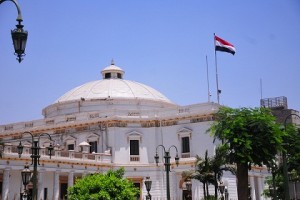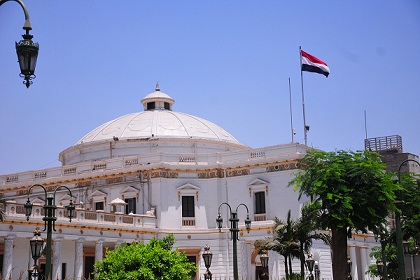
(DNE / FILE PHOTO / Hassan Ibrahim)
The Supreme Constitutional Court (SCC) issued a verdict Saturday declaring the unconstitutionality of a legal text which forbids dual citizenship holders from running in parliamentary elections.
This means that the Supreme Electoral Commission will open its doors once more for candidates to apply for parliamentary elections, to allow dual-citizenship holders to register.
According to Shawky El-Sayed Khater, a constitutional expert, the “banning” law violates the constitution. It was very restrictive about sole-holding of Egyptian nationality, including the mother’s and father’s nationality, during presidential elections.
“It has been like this in the Egyptian parliament; we have never had a parliamentary member with another citizenship than the Egyptian for over 10 years,” Khater said in statements to Daily News Egypt following the verdict.
“Those who made the law banning dual citizens from the parliament were sceptical about the motives of such members, or doubted their patriotism, on grounds that their loyalty could stand in between two countries they belong to,” he added.
Meanwhile, according to lawyer and expert in constitutional affairs Essam El-Eslamboly, the court ruling should benefit Egyptian expats. El-Eslamboly, who was behind the lawsuit approved Saturday, explained to Daily News Egypt Saturday that Egyptians living abroad should enjoy the rights guaranteed by the Egyptian constitution.
In the constitution, the state is committed to guard the interests of Egyptians abroad, protect them, and guarantee their rights and freedoms. It is also committed to enable them to fulfil their duties for the state and the community to participate in developing the homeland.
The debated article was within the Parliament Law, which was passed under former interim president Adly Mansour, who is currently the president of the SCC. The law stated that the first condition for parliamentary candidates is that they should only hold the Egyptian citizenship.
Arguments, including El-Eslamboly’s, justify the requirement on the grounds that “the loyalty of the citizen cannot be completely trusted to be to Egypt”. In fact, El-Eslamboly maintained this opinion, despite the demands of his lawsuits.
“I am only concerned with Egyptians’ living abroad because of their constitutional right,” he said. When asked what would be the difference between a dual citizenship holder who is in Egypt and one who lives abroad in terms of patriotic intentions, El-Eslamboly said that “those who live abroad only want the well-being of the country they have missed”.
Meanwhile, the law dedicated space to represent Egyptians living abroad in the parliament. In a candidates’ list of 15 people, at least one must be from that group, or at least three if the list has 45 names. Conditions also include that the candidate must have lived a minimum of ten years in another country.
Refaat El-Komsan, Deputy PM for parliamentary affairs, said the ruling does not necessarily apply to Egyptian expatriates, because not all of them have the citizenship of their country of residence. On the other hand, some of those residing in Egypt could have dual citizenships.
“The difference is that according to the law, Egyptian expats can run as parliamentary candidates on seats specified for the representation of Egyptians living abroad, if they meet the requirements, which are a minimum of 10 years of residence in the other country,” El-Komsan said in statements to Daily News Egypt following the verdict.
“But a local resident who has two citizenships can only run as a regular parliamentary candidate,” he added.
The new court ruling opens a new space for political parties and politicians to amend their electoral coalitions and plans. For example, the Free Egyptians Party, headed by business tycoon Naguib Sawiris, includes members who hold dual citizenships. “Because of the existing law, we did not seek to present them as parliamentary candidates. Now we might,” spokesperson for the party Shehab Wagih told Daily News Egypt.
Wagih strongly objected to claims of non-loyalty to Egypt by citizens who have dual citizenships, saying that some have endless expertise, including Ahmed Zuwail and Magdy Yaacoub, among others.
“Honestly, I think some who have only the Egyptian nationality act against the well-being of this country, and some who have multiple nationalities could be even more patriotic in their motives,” Wagih stated.
During the period of candidates’ registration, between 8 and 17 February, an inside source at the Supreme Electoral Commission told Daily News Egypt that many applications have been refused due to that legal constraint.
Meanwhile, a senior committee of judicial advisors at the SCC looked last week into lawsuits demanding the cancellation of more than one law related to the parliament due to contradictions with the constitution.
The committee told SCC that the law dividing parliament constituency violated constitutional guarantees for fair and equal representation. This resulted in the SCC halting the elections that were scheduled for mid-March.
Other claims were rejected due to the ‘non-specialisation’ of the person who filed it, who must either be a lawyer, or a concerned member, such as a potential candidate. The case of dual citizenship was originally filed by activist and leader of Al-Hayat Party Michael Mounir, who holds the American citizenship. It was then delegated to El-Eslamboly to carry on.
This is the second “unconstitutionality” verdict regarding elections since the beginning of March. Politicians and constitutional experts have other things to include, such as the parliamentary division of the country into four major electoral districts, grouping several governorates to be elected through the list-system for a total of 120 parliamentary seats, which some find to be “unfairly” representative.
.

